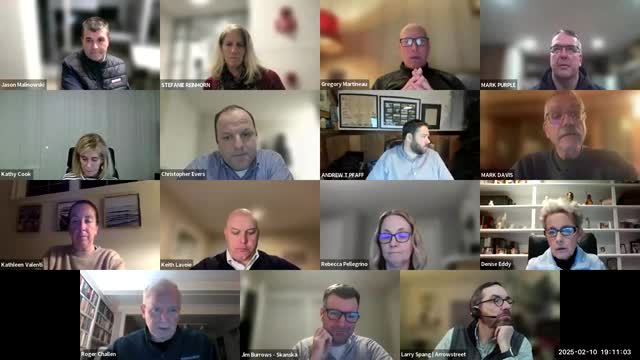Neary Building Committee presses design team for cuts as town share falls to about $78 million
Get AI-powered insights, summaries, and transcripts
Subscribe
Summary
At its Feb. 10 meeting the Neary Building Committee reviewed schematic drawings and a detailed financial update for the Neary School project, debated a $1.25 million contaminated-soil contingency, and directed the design team to pursue cost reductions ahead of an MSBA submission and a planned vote Thursday.
The Neary Building Committee on Feb. 10 reviewed a new schematic design packet and a detailed financial update for the proposed Neary School, and instructed designers and project managers to seek further cost reductions before the committee’s scheduled vote on the schematic design next Thursday.
Committee members were presented with a current town-share estimate of roughly $78,000,000 for the project, down from about $84,000,000 in August, and were told the total project cost that will appear in the MSBA submission is approximately $110,000,000. Committee members and consultants discussed several levers to lower the town’s bond request for Town Meeting and the MSBA submission: confirming federal and state credits for a proposed geothermal system, reducing the project’s grossing factor from 1.5 toward the MSBA-recommended 1.44, and trimming a series of scope and cost items including a $1.25 million allowance for premium contaminated-soil disposal and a $600,000 allowance for acoustical screening of rooftop equipment.
Why it matters: the committee must finalize a schematic design and cost estimate for the Massachusetts School Building Authority (MSBA) by late next week; the estimate will be used to determine the MSBA grant amount and will be presented to Town Meeting in May. Committee members said lowering the projected town share increases the project’s prospects for voter approval and reduces the amount the town must temporarily bond.
Design and schedule details
Consultants from Skanska and Arrowstreet presented a 17-page drawing set and renderings of the proposed building massing, site layout, and interior learning-common spaces. Designers said they expect only incremental changes to the floor plan but will circulate an updated schematic-design report that incorporates review comments before Thursday’s meeting so the committee can consider a vote then.
The design team noted the learning commons and flexible furniture shown in the renderings are part of the project program, and the committee discussed whether some learning-commons elements (not currently eligible for MSBA reimbursement) could be reclassified or otherwise documented to increase reimbursable square footage.
Contingency, soils, and pricing risk
A central point of debate was a $1.25 million contingency item to cover premium off-site disposal if contaminated soil is encountered during construction. The design and estimating team said that item was included because some soil may require higher-cost disposal; they also said bidders would submit unit rates during construction and that the allowance would be drawn down from construction contingency if needed. Committee members said they had no current test evidence showing contaminated soils beneath the building, but they were split on carrying the full amount in the submitted estimate. Several members suggested keeping a smaller allowance or relying on general contingencies to avoid inflating the MSBA submittal and the temporary bond amount.
Geothermal and federal/state credits
Committee members asked the team to confirm expected federal and state incentives for the proposed geothermal system and the amount that would be applied as a credit to the town share. Design staff said the earlier slide-deck estimate for geothermal incentives was roughly $12 million but that a conservative working figure of $3 million was being used for planning until the consultants could reconcile line-item estimates and confirm the tax-credit/rebate value under the Inflation Reduction Act and applicable state programs.
Grossing factor and potential square-footage reductions
The team and committee discussed the project grossing factor (the multiplier that converts program net area to gross building area). The estimate currently uses a 1.5 factor; MSBA guidance recommends about 1.44. Consultants said the building plan is already compact and that lowering the multiplier meaningfully would require targeted plan edits (for example tightening certain circulation or stair areas) rather than a simple arithmetic change. The committee asked the consultants to identify specific opportunities this week that could produce several thousand gross square feet of savings without sacrificing mandatory educational program elements.
Other items under review
The estimate excludes three alternates (playground, sliding doors, second art room); consultants said those remain separate. The design team also proposed a $600,000 acoustic-screening allowance for rooftop equipment to reduce sound impacts on nearby homes; members asked the team to explore whether the scope could be reduced by orienting equipment away from neighbors or by refining the screening design.
Next steps and schedule
The committee set a follow-up meeting for Thursday to consider an updated schematic-design report and a revised cost submission to the MSBA. Consultants said the MSBA submittal is due the following week; the project funding agreement and final grant numbers would follow after a successful MSBA vote. The committee asked staff and the consultants to provide an updated financial slide showing the history of price revisions and the tax-impact per household for Thursday’s session so the public and Town Meeting members can see how the estimate has changed over time.
Votes at the meeting were limited to procedural approvals; the substantive vote on schematic design was deferred to the next meeting.
